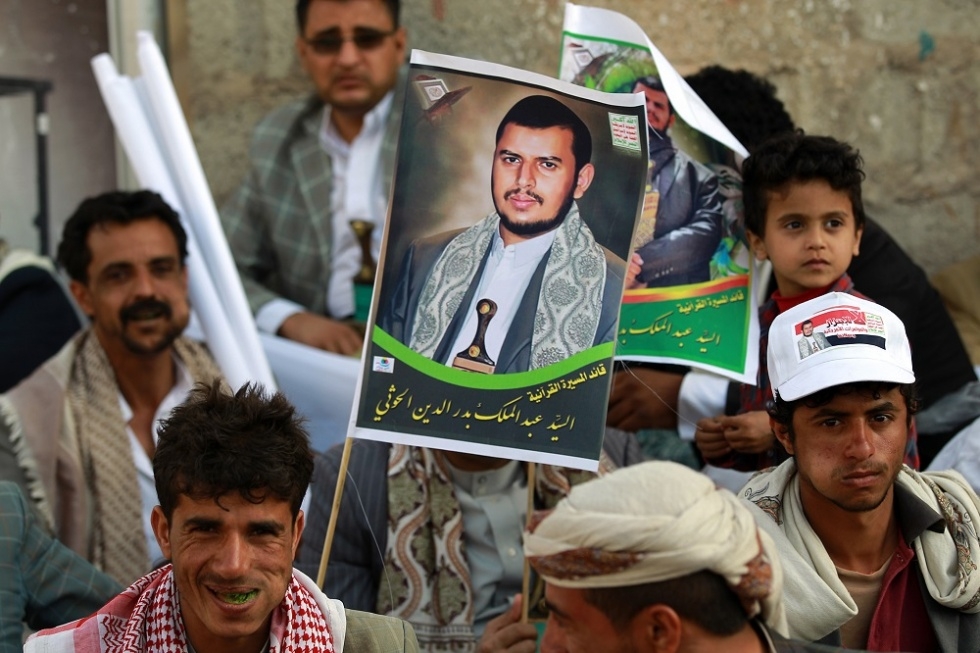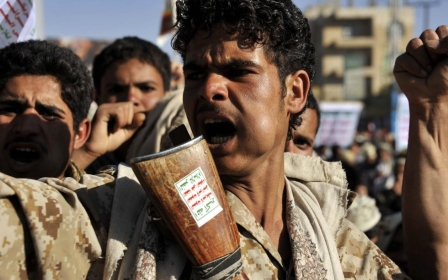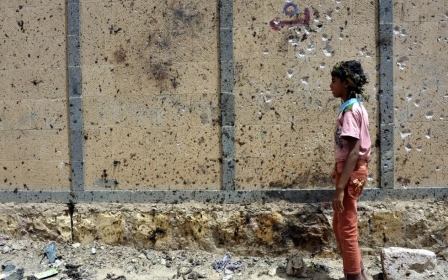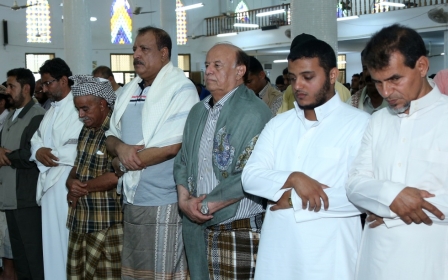Yemen's Houthis advance closer to Aden

SANAA - Houthi rebel fighters have captured key facilities in Taez, Yemen's third-largest city, including the international airport, ramping up a seven-month offensive against the government here that diplomats say could draw in neighboring Saudi Arabia and its main regional rival Iran.
The Houthis’ advance into the city appears to have placed the rebels on a path toward direct military confrontation with opposing troops loyal to President Abd Rabbu Mansour Hadi, based in Aden, about 120 miles southeast of Taez.
A security official in Taez told Middle East Eye that the Houthis were airlifting troops and military equipment into the city’s airport.
Yemen has witnessed deadly and widespread violence for almost a week, raising fears that the impoverished country is headed toward civil war. Diplomats have all but admitted failure in brokering negotiations to end the conflict, while opposing forces on the ground accelerate their preparations for battle.
The Houthi advance into Taez was met by angry protesters who used catapults to fire rocks at the Houthis' vehicles upon their arrival.
The Shiite militia then opened fire and fired tear gas to disperse the protesters. According to local media reports, at least one protester has been killed and others wounded.
According to protesters in Taez, the Houthis entered the city in a military convoy with hundreds of fighters.
The Houthis have also opened a new front near the border of the oil-rich Mareb province, east of Sanaa, where sporadic clashes broke out over the weekend between Houthi fighters and local Sunni tribes loyal to Hadi.
'Military coup' in the making
Hadi last month fled the capital for the safety of Aden.
A member of the Houthis' political bureau, Mohamed al-Bukhati, said his movement will take new security measures to protect Yemen.
“No one should blame us for the new security measures, which we will undertake because these measures are intended for the protection of Yemen and protecting ourselves,” he said on Sunday.
In a televised address also made on Sunday night, Abdel Malik al-Houthi, the leader of the Houthi faction, vowed to send fighters farther south into Aden to track down Hadi, the president forced from the capital by the Houthis’ advance.
In an hour-long speech, Houthi repeatedly denounced what he called a “conspiracy” against Yemen that included Hadi, al-Qaeda and the Islamic State, as well as the United States, Saudi Arabia, Qatar and Israel. He called a suicide bomb attack that hit mosques in the capital on Friday part of the conspiracy, and said Hadi was merely “the puppet used by these powers as a cover for the conspiracy".
In the south, militias loyal to Hadi (known as Southern Popular Committees) took control of all key military bases in Aden, including the airport. The takeover came after southern militias disarmed Central Security Forces backed by former president Ali Abdullah Saleh.
On Saturday, forces loyal to Hadi known as popular committees overran an air base in southern Lahj province after the evacuation of more than 100 US Special Forces personnel from the base.
With each side gaining ground and beefing up militarily, the stage seems to set for an all-out civil war, even more so after Hadi declared the Houthi advancement in Sanaa as an “illegal military coup”.
In his first televised address after his escape from Sanaa, Hadi said on Sunday that: “The Yemeni people have put their confidence in me, and I shall give my life in return and I will defeat the Houthi coup.”
Hadi also condemned the Houthis for "raising the Iranian flag" in the Houthi stronghold province of Saada. He said his mission will be to replace the Iranian flag with the Yemeni flag.
Ala al-Shalili, a Yemeni political expert, told Middle East Eye that the countdown for a sectarian and territorial conflict has begun. “This is the beginning of a war which could ignite within the next 48 hours,” he said.
“The media war always precedes the actual war and this has already transpired. The next phase is war, if a political deal is not reached immediately.”
According to Shalili, Yemen has become a battle ground for Saudi Arabia and Iran, which are using Yemeni factions to implement their foreign agendas.
“Unfortunately, most Yemeni factions don't realise that they are just pawns in a game of chess between Saudi Arabia and Iran. Perhaps this reality will soon be uncovered.”
Intervention
A UN mediator on Yemen, Jamal Benomar, said on Sunday that recent events "seem to be leading Yemen further away from a peaceful settlement and towards the edge of civil war".
Saying it was illusory to think Houthi militia could take over all of Yemen or that Hadi could assemble enough troops to take back the country, Benomar told the UN Security Council: "Any side that would want to push the country in either direction would be inviting a protracted conflict in the vein of an Iraq-Libya-Syria combined scenario."
The Security Council condemned the takeover of much of Yemen and its institutions by the Houthis and warned of "further measures" if hostilities did not end.
Iran called for dialogue, but suggested Hadi should leave to spare the country further bloodshed.
New MEE newsletter: Jerusalem Dispatch
Sign up to get the latest insights and analysis on Israel-Palestine, alongside Turkey Unpacked and other MEE newsletters
Middle East Eye delivers independent and unrivalled coverage and analysis of the Middle East, North Africa and beyond. To learn more about republishing this content and the associated fees, please fill out this form. More about MEE can be found here.




